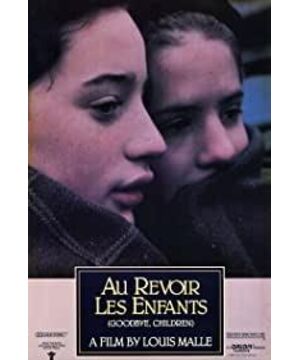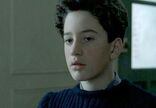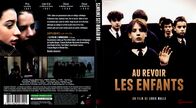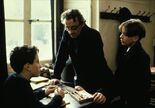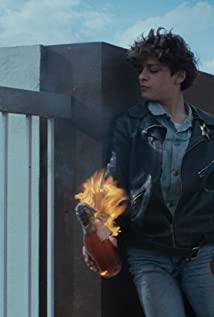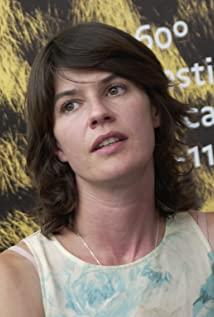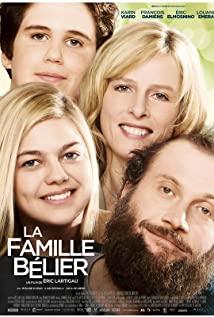Goodbye is a farewell look; goodbye is a farewell of "See you later, children!" Goodbye is a gentle lift right hand. However, goodbye is also the last back. The three children and the priest were taken out of the school by the German soldiers. For them, it seemed as if they turned their heads and could see the children and teachers who were watching, they could see the school that seemed to have been isolated from the world, and they could even hear the Bible reciting silently, but for a short time. The "goodbye" of , however, points to a farewell. The moment Tang Tan saw them step out of the school gate, he silently raised his right hand, and when he waved goodbye, Bonnet turned his head to look at him, but before he could say "goodbye", only a back was left. , a back that can never look back, a back that annotates the impermanence of fate, a back that will be remembered again 40 years later.
"More than 40 years have passed, but, until I die, I will not forget this morning in January, every second of it is still fresh in my memory." 40 years are nothing but a goodbye that can't be turned back, Contin is alive After another 40 years of his own life, for Bonnet, for Father Jean, for those Jewish children who were taken away, there has never been another 40 years in his life, Bonnet , Guene and Dupree died shortly after in Auschwitz, leaving the priest imprisoned in Maddoxen and finally dying. The school reopened its doors in October 1944. "Their fate is in that place called the concentration camp. This is the last morning in January 1944. This is the morning that leaves a goodbye in the shadows. This is a morning that cannot be kept secret forever, but it is also the only morning-- Kantan's eyes, Kantan's tears, Kantan's right hand, witness this morning, witness this goodbye, witness the war without gunpowder but death, the most important thing in life is pulled away in this way , like a crack that lasts forever.
But then, Contin asked Bonnet: "This is 1944, is there another 17 January 1944?" Why would there be another 1944, another morning? The other is the redefinition of the meaning of life and the redefinition of the way of goodbye? Before Bonnet, Contin said that he was the only one who thought about the meaning of death. How could a child who was sent from Paris in the war zone to this Carmelite abbey Saint-Jean Delacroix school think of "another" "January 17, 1944? How to think about the meaning of death? Kantan seems to be a rich man's child, even though his parents witnessed the bombing of Paris, experienced the closing of factories, and were threatened by war, at least they were not Jewish, and even in the school dormitory, he was a man who did not say goodbye to bedwetting. Boy, the meaning of death seems like an empty doctrine, as isolated from the world in this school where you can only hear the cannons but safely hide in the bunker.
But just like a state of being alive, Kantan's thoughts on death are completely the realization of life. "I wanted to urinate in a dream, and then I got it out. It's a wonderful feeling." Although he wiped off the urine stains with his clothes and put them on the sheets in the dark, once he woke up, this wonderful feeling The feeling of release turned into ridicule from the classmates. Yes, living in isolation is like a process of deciphering in a dream, constantly searching and releasing freely, but once you wake up, it will be like the malicious fate of fate, and you will never be able to escape. In the world of Contan, Bonnet's arrival, Bonnet's mystery, Bonnet's identity, is completely a wonderful dream. Wonderful is a strange feeling. This new kid doesn't talk much, but he excels in various subjects. He is the first to raise his hand in mathematics. Instead of learning Greek, he read the novel "Sherlock Holmes"... In Contin's eyes, he was excellent, but like other classmates, he also had some kind of jealousy towards Bonnet, and contempt after jealousy.
Bonnet walked into this school, but he was different from his classmates everywhere. He was placed in the same bed where the child with whooping cough left. There were books in his suitcase, and he would order in the evening. Read on candles. So this mysterious classmate is an outlier in the eyes of classmates. They call him a "pagan". They put icicles from the faucet in his clothes, vitamin biscuits licked by his mouth, and when walking on stilts bully him. Either he was envied because he was too good, or he was ridiculed for never having his parents, but Bonnet never seemed to want to be part of this group and never wanted to tell others his secrets.
In Kantan's view, such a classmate has also become an outlier, calling him a "flattery" because he played the piano better than himself, suffering repentance for stealing a letter from Bonnet's family, and flipping through his drawer. Only then did Kontan discover the family photo he was hiding, only then did he find out that his real name was "Kibostan", only then did he know that he didn't eat pork at all, and only then did he know that he was a Jew. "Jew" seems to be a taboo word, with "Jews not allowed" written on the door of public bathrooms, "Jewish pigs forbidden" in restaurants, and self-defense team members called "traitors" in schools from time to time Searched while in a restaurant an old Jew was threatened by self-defense. As a Jew, Bonnet actually hid his identity and name in this school.
This is a secret. Contain discovered this secret, but he also kept it. In fact, in his opinion, even if Bonnet does not eat meat, it is only his own life. He does not care about politics, race, or heterogeneity. Teach, in his relationship with Bonnet, he gradually discovered the two people who have similar interests. They became partners, watching "Shandan Nights" together in the light of the flashlight, and reading the paragraphs of "Wild Fornication"; Playing the piano together, intoxicated by the beautiful music, they refused to enter the dark bunker even if the explosion sounded in the distance; together they found that treasure in the dark forest, cheering but lost, under the curfew It was the most wonderful life, the happiest childhood, they wore shorts and stockings in the coldest winter, they sang a clear and beautiful song as they walked in line, they Fight childishly on stilts.
Segregated teenagers, segregated racial discrimination, segregated threats of war, they even watched Chaplin's comedy film "Immigration" in school, hated Hitler and hated Nazis, and rebelled against race in the form of movies Discrimination, rebellion against war and domination, so screening movies in schools is a metaphor in itself, children are completely immersed in the comedy world of movies, innocent smiles, beautiful music, seems to be on the back of this harsh reality. But this is not eternal isolation, the swaying ship in the movie seems to be a symbol of this era, no one has a sense of security, escaping in the sway, and Chaplin seems to fall in love with that beautiful girl, "they fell in love "Love is joy and happiness, just like this innocent childhood, it should show the most wonderful colors. But it was just a chance encounter, where the immigrants were isolated, seemingly unable to cross that rope, unable to cross the invisible bondage.
A comedy movie where the laughter can stop abruptly, and the movie is always a part of reality, Bonnet and Quantin win the game of finding the treasure, but they are faced with the darkness of the forest, the hideousness of the boulder, the wild boar The terror of the German soldiers, even if they were sent back to school, for them it was a test of reality, and the lie of "meet 50 pigs and hear German gunfire" seems to be Their imagination of reality, the imagination is not fantastic, and it contains the same inescapable real dilemma as the movie. Yes, this convent school has never been isolated from the world, there has always been a terrifying siren, and there have always been all kinds of whistleblowers and searches. The lame Joseph was not ridiculed because of his body, but his broken mind went down a path of betrayal. Engaged in black market transactions, giving cigarettes and stamps to classmates, but also getting children's jam and money, but such transactions touch the religious teachings, "We should share, we should not be contaminated with the smell of copper, and we should not steal." Therefore, being expelled from the school is undoubtedly a dead end for Joseph. He has no relatives and no accommodation. In the face of this reality, he may only choose to sell his secrets and survive.
"Whoever eats my flesh and drinks my blood will have eternal life. For my flesh is indeed food, and my blood is indeed drink." Let the priest ask people to pray, this is for religion Strange, this is the doctrine of mercy, the solemn Eucharist is to protect everyone who believes in God, but in this reality, who can religion save? "We pray for those who are starving, for those who suffer, for those who are persecuted... We pray for the victims and for the executioners." And it is in this prayer, in this In the secluded school, the Nazi soldiers broke in, they took "Kibostan", took away Guene, took all the Jews, and took the priest who sheltered them, and then used the children to be arrested. Dispersed, the school was closed. Who is starving, who is suffering, who is persecuted? Who is the executioner? Calling people kindness, calling people fraternity, but in the face of ruthless war, only to drive away, only goodbye and farewell, only life and death.
It's just that swaying ship, just that rope that binds, the laughter and true love in the movie are ruthlessly isolated, but where will the innocence and friendship in reality go? When Bonnet was packing, Contin gave him the Arabian Nights book, which contained adventures and fairy tales, struggles and desires, secrets and metaphors. The world in the book is like a movie, which needs to be opened and read. When the lights are on, it takes courage and thinking to hide in the box, in the memory, and in the story of growing up. Perhaps this is the memory of childhood, this is an escape from reality, this is a resistance to war, but no one can see another January 17, 1944, can no longer come back after goodbye, no one can use the humble A life sticks to a belief. Goodbye is also a farewell. Only after experiencing all this will that morning become the only morning and the only memory.
View more about Au Revoir les Enfants reviews


